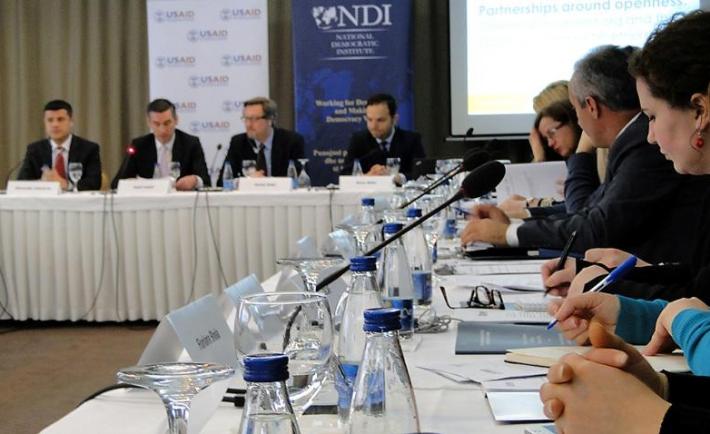NDI President Derek Mitchell continues his conversation with his predecessors, Brian Atwood and Ken Wollack about NDIs history since the fall of the Berlin Wall. In this episode they discuss NDIs impact on the trajectory of democratic development, and where they see the greatest potential for dramatic democratic change.
What is NDI's impact on the trajectory of democratic development? (w/ Brian Atwood & Ken Wollack)
30 years since the Berlin Wall fell, progress for democracy continues
Madeleine K. Albright visits the crumbled remains of the Berlin Wall to mark the 30th anniversary of its fall.
Last week marked the 30th anniversary of the fall of the Berlin Wall. Amid the remembrances, debates over "what went wrong" and doubt about democracy's promise in some quarters almost seemed to overshadow the celebrations.
The good news about Ukraine – and why it deserves our support.
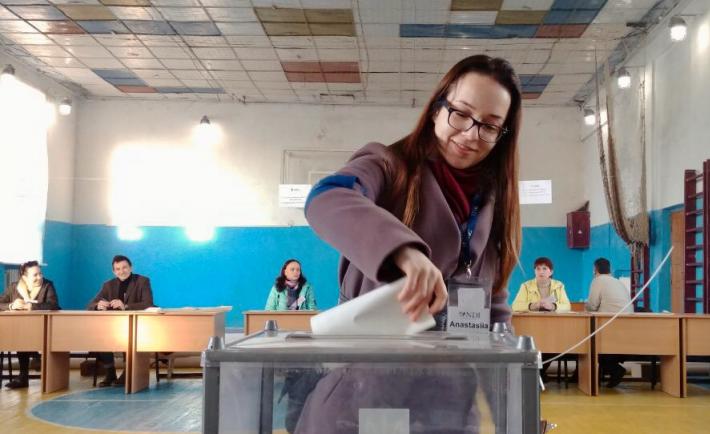
An NDI staff member votes in the March 31, 2019, presidential election, while accompanying international election observers as they observed opening, voting, counting, and tabulation processes in Kyiv and 13 other regions across the country.
Ukraine is all over the news these days, albeit not in a good way. That is unfortunate. The country deserves much more – and favorable – support for its democratic progress and remarkable resilience in the face of economic hardship and unrelenting Russian aggression. Five years after the Revolution of Dignity ushered in a new democratic moment in 2014, Ukraine’s people in fact are as unified as ever in their aspirations for a more democratic, peaceful and corruption-free society.
How do we put human beings at the center of designing for democracy?
_1_0_0_0.jpg)
Since 2014, hundreds of governments, and civic and political organizations have used DemTools, NDI’s democracy toolkit.
Since 2014, hundreds of governments, and civic and political organizations have used DemTools, NDI’s democracy toolkit. DemTools is an open-source software suite designed fill the critical needs of NDI’s partners around the world: involving citizens in decision-making, helping civil society organize for change, managing election data, and pushing their message out to thousands of people at a time.
Global Women's Leadership Program Brings Women MPs to World Bank 2016 Fragility Forum
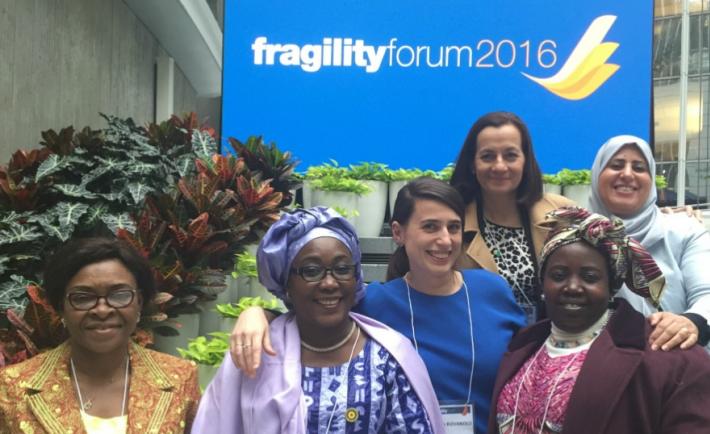
After the delegates' closing remarks at the 2016 Fragility Forum, from left to right: Stella Ngwu (Nigeria), Aissata Toure Diallo (Mali), Besa Rizvanolli (NDI), Clara Rojas (Colombia), Sabina Dario Lokolong (South Sudan), Dr. Sultana Mismari (Libya)
In fragile and violent places, whether it is Colombia, Libya, Mali, Nigeria, or South Sudan, the role of women during crisis, war, and post-conflict reconstruction has been critical. Conflicts often force women to get organized and to safeguard the basic necessities that bolster day-to-day life in each family. They also participate in fighting wars, and in rebuilding their communities. Women act as peacekeepers, relief workers, and mediators. Yet, when peace talks occur, women are not invited to the table and peace agreements are often drafted without the critical perspectives of women.
With this reality in mind, under USAID’s Global Women’s Leadership Program (GWLP), NDI brought a delegation of women members of parliament (MPs) to the World Bank Group Fragility Conflict and Violence Forum 2016 (also referred to as the Fragility Forum) in Washington, DC in early March.
Global Women's Leadership Program Brings Women MPs to COP21
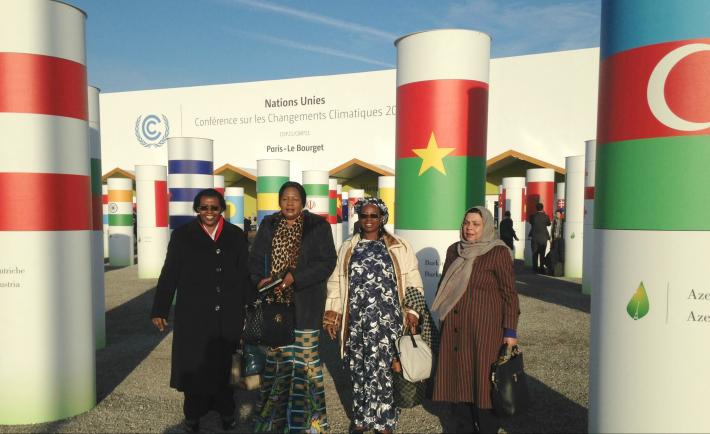
Members of the GWLP delegation of women parliamentarians to the COP21 Summit in Paris, from left to right: Margaret Nantongo Zziwa, Uganda; Ake Camille Epse Akoun, Ivory Coast; Joséphine Drabo Kanyoulou, Burkina Faso; and Tayeba Zahidi, Afghanistan. Photo by Aretha Francis.
Under the Global Women's Ledership Program supported by USAID, NDI sent four women parliamentarians to the COP21 climate change summit in Paris.
Integration: Helping Democracy Deliver
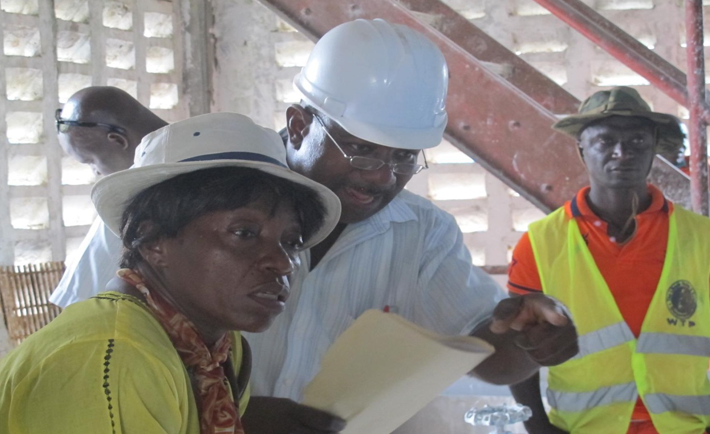
In Liberia, engineer James Kendor explains to Senator Joyce Freeman Sumo how water is distributed to her constituents. Credit: Varney Karneh
In most places where NDI operates, the relationship between citizens and government needs work. Instead of serving citizens, government institutions are often weak, co-opted by elite interests, or ineffective due to corruption and impunity. When government is unable or unwilling to address basic needs, citizens suffer.
Kosovo Assembly Endorses the Declaration on Parliamentary Openness
The Declaration on Parliamentary Openness is a call to the world’s parliaments to increase their commitment to citizen engagement in legislative work. Collaboratively drafted by the global parliamentary monitoring community, the declaration has been endorsed by more than 180 civil society organizations (CSOs) in over 80 countries. Increasingly, parliaments are also signing on to the declaration. On May 4, the Assembly of the Republic of Kosovo formally endorsed the declaration, joining a small vanguard of parliaments around the world.
Nepal Earthquake: All NDI staff and immediate families safe and accounted for
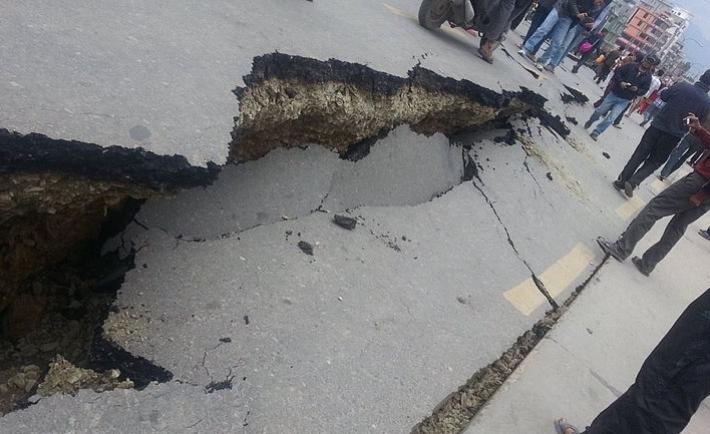
Road fractured after Nepal earthquake. Credit: Krish Dulal
All NDI Nepal staff and their immediate families are safe and accounted for. Currently, we have 20 national staff members, two resident international staff and their dependents, and two visiting international consultants in-country. At the time of the quake, many of our staff members were in Dhulikel – about an hour away from Kathmandu – conducting a training program with parliamentarians and political leaders.
In Discussion on Gender and Decision-Making, Only One Gender Represented
Glancing around the room, it seemed that the Feb. 24 event that NDI’s Gender, Women and Democracy (GWD) team put on had a great turnout. About 60 people from the federal government, academic institutions, multilateral organizations and NGOs were present. Despite the impressive attendance, one startling detail caught my attention as everyone took their seats: nearly everyone was a woman – there was one man on the panel and only two male guests in the audience. This, to me, spoke volumes about the state of the movement for women’s empowerment and gender equality.

